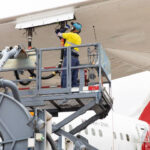SAFFiRE’s corn-to-ethanol pathway uses technology known as Deacetylation and Mechanical Refining (DMR), for which it has an exclusive licence. The technology was developed at the National Renewable Energy Lab of the US Department of Energy to produce ethanol with an ultra-low carbon intensity for conversion to SAF. It will now be available to Conestoga Energy as SAFFiRE’s new owner.
The sale of SAFFiRE to Conestoga Energy coincides with a major efficiency restructure by Southwest, which is ranked by aviation data company OAG as the world’s third largest airline by capacity deployed, and the largest low-cost carrier.
Southwest initially invested in SAFFiRE Renewables in 2022 during the first phase of a pilot project by the energy company, and following full acquisition in March 2024 by newly-created SARV, it planned to progress to phase two, which included SAFFiRE developing a pilot plant within Conestoga’s Alkalon Energy ethanol facility near Liberal, Kansas.
Commenting on the SAFFiRE acquisition at the time, Southwest’s President and CEO, Bob Jordan, said: “This marks Southwest’s transition from investor to sole owner of SAFFiRE, expressing our confidence in their technology and its potential to advance our sustainability goals, as well as the goals of the broader industry.
“Championing SAF is a key pillar of Southwest’s ‘Nonstop to Net Zero’ plans and our work toward a more sustainable future for air travel. We look forward to continuing our journey with SAFFiRE as part of our efforts to propel this promising technology forward.”
In February 2024, SARV also invested $30 million in LanzaJet, a specialist in alcohol-to-jet (AtJ) fuel production, through which ethanol is converted to sustainable aviation fuel. Through that partnership, LanzaJet intended to build an ethanol-to-SAF facility primarily to produce fuel for Southwest, using ethanol supplied by SAFFiRE.
The airline did not comment on why it was now disposing of SAFFiRE, simply stating that it was “proud to have incubated SAFFiRE’s early-stage technology” and “pleased that Conestoga will move it to the next stage of commercialisation.”
Conestoga’s CEO, Tom Willis, is upbeat about the deal. “Sustainable aviation fuel represents a multibillion-dollar market opportunity,” he said, “and this acquisition positions Conestoga at the leading edge of efforts to bridge the critical supply-demand gap facing the aviation industry while creating transformative opportunities for American agriculture.”
Conestoga already owns and operates two ethanol plants, which generate both corn-based ethanol and cellulosic biofuel, and manages more than 200 million gallons per year. The SAFFiRE pilot production facility is expected to be operational in 2026.
While financial terms of the sale were not disclosed, Conestoga will acquire all of SAFFiRE’s intellectual property, some related technologies and the proposed pilot facility.
As well, key members of the SAFFiRE leadership team including the Chief Technology Officer, Marykate O’Brien, and Director of Engineering, Nitin Kolhapure, will transfer with the company.
“The intellectual property acquired in this transaction will provide us with tremendous optionality not only as it relates to SAF feedstock production, but across our operations,” added Willis.
“The momentum behind low carbon intensive fuels is undeniable, driven by regulatory requirements, corporate commitments and environmental necessity, and this acquisition is reflective of our commitment to delivering the lowest carbon biofuel solutions while creating new value streams for rural communities across America.”
Southwest’s decision to exit SAFFiRE Renewables coincides with news revealing the suspension of operations at the Paramount, California plant of SAF pioneer World Energy following the withdrawal earlier this year of key partner, Air Products.
In April 2022, the two companies announced the $2 billion development of what they claimed would be North America’s biggest SAF facility, expanding World Energy’s existing Paramount plant.
Air Products announced that it would construct, own and operate a hydrogen plant within the facility, while World Energy would focus on renewable fuels manufacturing.
The expanded facility was due to begin operations this year. But in February, Air Products terminated three investments, including the World Energy deal, about which it said: “The decision to exit reflects challenging commercial aspects surrounding the expansion project and current operations.”
Following a recent critical article by Reuters that questioned the progress of the SAF industry, and singled out the split between World Energy and Air Products, World Energy CEO Gene Gebolys took to social media to confirm that “our plans for our Paramount site are undergoing a reset.” But he added that sceptical media reports failed to recognise that significant progress had been made.
“We’ve always known that decarbonising flight was never going to happen overnight, and that it was never going to be easy,” he said. “Setbacks are part of the journey, as they were in the early days of fossil fuel production, commercial aviation and virtually every other major industry in its early days.”
In the Reuters article, Gebolys criticised though a lack of commitment from the airline industry, adding that stronger incentives were also needed from governments to drive progress.
Photo: Southwest Airlines

Tony Harrington
Correspondent















More News & Features
News Roundup September 2025
Catagen launches SAF production company and signs offtakes with Ryanair and Shell
ICAO and IRENA launch Finvest platform to connect sustainable aviation projects with financiers
US rebukes ICAO for wasting resources on climate financing initiatives and warns against global levies
Australia announces A$1.1bn incentive scheme to drive local production of low carbon fuels including SAF
Oneworld airline partners join with Breakthrough Energy Ventures to invest in new SAF technologies